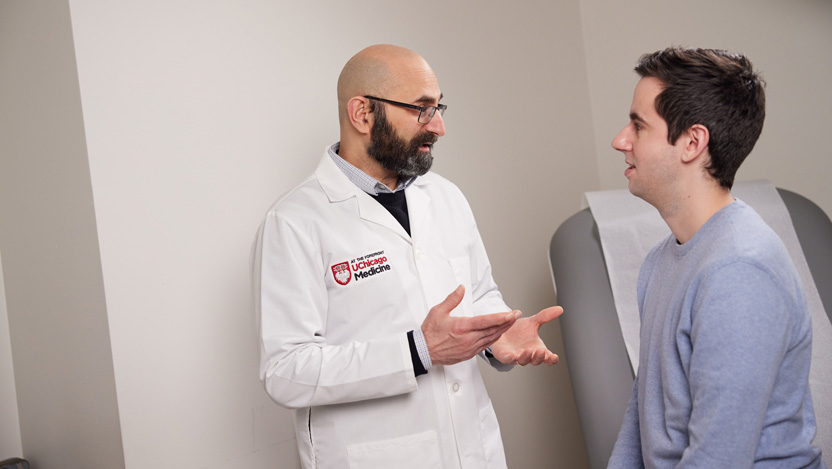Epilepsy and Seizures

Comprehensive Epilepsy Center
The Comprehensive Epilepsy Center at the University of Chicago Medicine is at the forefront of epilepsy care. Many of our patients come to us after trying a number of different medications and therapies with little success.
Schedule an Appointment with an Epilepsy Expert
Leading Advancements in Epilepsy Care
Backed by the development of groundbreaking diagnostic techniques and a long history of research, our expert team has the experience to manage nearly all epilepsy-related problems from new onset seizures to rare and difficult-to-treat epileptic syndromes. With non-invasive technology and contemporary diagnostic techniques, we can pinpoint the origin of most seizures with precision. Having this advantage can significantly increase diagnostic accuracy and improve patient outcomes.
Recognized for Excellence

We’re recognized as one of the best. We have two nationally classified Level 4 epilepsy centers — one for adults and one for children. That is the highest possible classification granted by the National Association of Epilepsy Centers.
We offer continuous care throughout the patient’s lifespan. Doctors at the adult and pediatric epilepsy centers, combined into one comprehensive epilepsy center program, work together every day to make sure patients receive seamless care when they transition from childhood to adult care.
What is Epilepsy?
Epilepsy is a chronic, neurologic disorder in which clusters of nerve cells sometimes signal abnormally, often causing a seizure. Seizures are the main symptom of epilepsy. When someone has two or more unprovoked seizures, doctors diagnose epilepsy. Symptoms vary depending on the type of epilepsy and seizure.
There are many types of epilepsy. Some types of epilepsy and epilepsy syndromes include:
- Benign rolandic epilepsy
- Childhood absence epilepsy
- Doose syndrome (myoclonic astatic epilepsy of childhood)
- Frontal lobe epilepsy
- Infantile spasms
- Juvenile myoclonic epilepsy
- Landau-Kleffner syndrome
- Lennox-Gastaut syndrome
- Occipital lobe epilepsy
- Parietal lobe epilepsy
- Rasmussen's syndrome
- Sturge-Weber syndrome
- Temporal lobe epilepsy
- West syndrome
- UChicago Medicine offers advanced surgical and epilepsy device treatments that are not widely available, including new options for patients not previously considered candidates for surgery.
- Our expert team has the experience to diagnose and manage nearly all epilepsy-related problems. We can pinpoint the origin of your seizures, or the “seizure focus,” and determine the best treatment plan.
- UChicago Medicine neurologists are highly experienced in determining the best medication to control seizures with minimal side effects.
What is a Seizure?
A seizure is a sudden surge of abnormal electrical activity in the brain. Electrical activity in the brain is normal. It’s how our brain works. Seizures occur when there is significant disruption of that normal electrical activity in the brain. The general symptoms of seizures may include changes in consciousness, sensation, movement or behavior.
Is a Seizure the Same Thing as Epilepsy?
No. Not all seizures are caused by epilepsy. Approximately 10 percent of the general population may experience a seizure during their lifetime, but only 1 percent of the population has epilepsy. A single seizure may or may not progress to a chronic and recurrent condition or epilepsy. Epilepsy symptoms include recurring seizures with no main trigger.
Types of Seizures
Although there are many types of seizures, epilepsy seizures commonly fall into generalized and partial (or focal) seizures.
Generalized Seizures
Generalized seizures are characterized by widespread electrical discharges in both sides of the brain. You might think of it as a lightning storm in which the lightning seems to be coming from all areas of the sky at the same time.
There are six types of generalized seizures:
Also known as petit mal seizures. When people experience an absence seizure, they may seem to disconnect from the world, blank out or stare into space for at least a few seconds. Their eyes may roll as well. People who have absence seizures usually lose awareness for a short time and have no memory of the seizure afterward. This type of seizure usually begins between the ages of 4 and 14, and it can resemble daydreaming. Subtle body movement may accompany the seizure, but it’s not the jerking movements that occur with tonic-clonic or clonic seizures.
Also known as drop attacks, drop seizures or akinetic epileptic drop attacks, may involve a sudden loss of muscle tone, a head drop or leg weakening. People suffering an atonic seizure may suddenly collapse. This type of seizure may also cause the person suffering it to drop objects.
Includes jerking muscle movements that are more rhythmic than chaotic. The muscle spasms typically affect the face, neck and arms. They may last for several minutes.
Are typically short and involve uncontrollable jerking, usually of the arms and/or legs, and last for only a second or two.
Also known as grand mal seizures, are what most people think of when they imagine a seizure. They involve a loss of consciousness, stiffening of the body and shaking or jerking, sometimes followed by loss of bladder or bowel control
Includes body stiffening, but does not include the clonic phase of uncontrolled jerking or spasms. Back, arm and leg muscles are affected most often. The seizure may cause a patient to fall or collapse.
Partial Seizures
Partial seizures fall into one of two groups:
(Also known as simple focal seizures) may only include the aura stage (see below). During this type of seizure, awareness, memory and consciousness remain intact. This type of seizure may alter emotions or change the way things look, smell, feel, taste or sound. It may also result in involuntary jerking of a body part, such as an arm or leg, or spontaneous sensory symptoms, such as tingling, dizziness and flashing lights.
(Also known as psychomotor seizures) alter consciousness or responsiveness. The person having the seizure may appear to be staring into space or moving without purpose. Some common movements include hand rubbing, chewing, swallowing, and repetitive motion, such as bicycling leg movements or walking in a circle.
Stages of a Seizure
For some types of seizures, an aura happens before a seizure and may alert a person that a seizure may occur. Auras typically begin seconds before the seizure.
The symptoms that accompany an aura can vary depending on the type of seizure and the area of the brain affected. Some symptoms of aura include:
- Abnormal sensations
- Deja vu (familiar feelings) or jamais vu (unfamiliar feelings)
- Distorted emotions, such as panic or fear
- Forced thinking
- Nausea
- Perceived sounds, tastes, or smells (some people report smelling burning rubber, for example)
- Physical sensations, like dizziness, headache, numbness, and lightheadedness
- Unusual feelings
Ictus is another word for the seizure itself — the part of the seizure that outsiders can witness. It can be convulsive, commonly called “grand mal,” or non-convulsive, such as staring and inability to respond normally.
The postictal stage occurs after the ictus or active stage of the seizure. During the postictal stage, the body begins to relax and aftereffects may set in. The type and length of aftereffects will vary from person to person and may include:
- Confusion and agitation
- Fatigue and drowsiness
- Headache
- Loss of bowel or bladder control
- Loss of consciousness or unresponsiveness
- Numbness
- Partial paralysis








